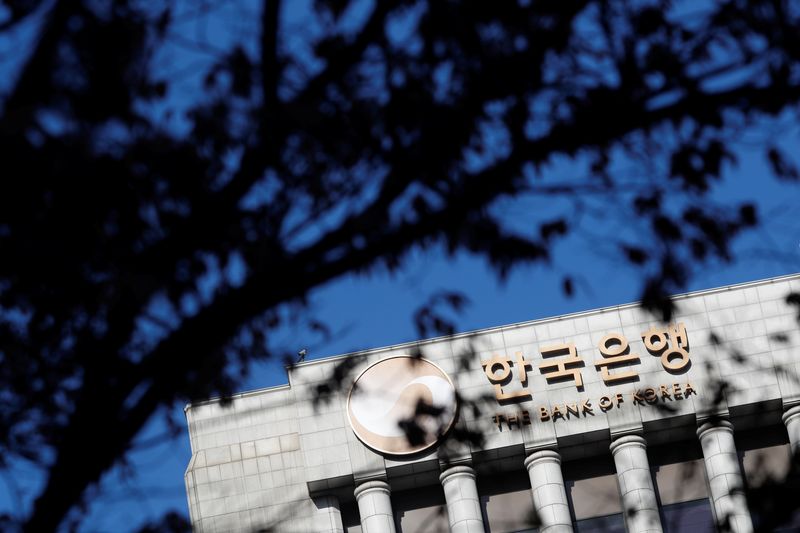By Cynthia Kim and Jihoon Lee
SEOUL (Reuters) -South Korea's central bank kept monetary policy unchanged at its final policy meeting of the year on Thursday and signaled it may need to keep interest rates higher for longer to head off persistent inflation risks.
The Bank of Korea (BOK) held its key policy rate at 3.50% at a policy review meeting in Seoul, as expected by all 36 economists polled by Reuters.
The pause marks the seventh straight meeting at which officials have remained on the sidelines during this rate cycle, in which borrowing costs have jumped 300 basis points.
The bank also upgraded next year's inflation forecast to 2.6% from 2.4%, while cutting its projections for economic growth to 2.1% from 2.2% seen previously.
Crucially, the bank omitted language from previous statements saying that restrictive policy stance could be maintained for "considerable time," and replaced that with "sufficiently long" period.
"It means we are going to take enough time until we are sure that inflation has sufficiently converged - it could be six months but realistically I'd say it's likely to be longer than that," governor Rhee Chang-yong said in response to a question about how long rates would need to stay high.
The yield on the three-year bond barely moved in response to the decision and comments.
"That implies that officials are trying to push back any talk of rate cuts for at least six months," said Cho Yong-gu, a fixed-income analyst at Shinyoung Securities. He expects BOK rate cuts to start from the third quarter of 2024.
Most economists see the BOK as having reached its peak rate and expect it to start easing policy from the third quarter of next year as cooling inflation makes restrictive borrowing costs difficult to justify to the public.
Like its U.S. and European peers, the BOK hasn't shut the door on further hikes and remains wary of risks that inflation doesn't ease.
But investors in recent weeks have bolstered bets that central banks, including the Federal Reserve, will pivot to rate cuts next year as inflation slows down.
The Reserve Bank of New Zealand on Wednesday left its policy rate unchanged, following similar decisions by its peers in the UK, Canada, Malaysia and the European Central Bank.
South Korea's economy, Asia's fourth-largest, grew faster than expected in the third quarter thanks to improving exports, while business sentiment for December reached the highest in over a year.

The restrictive monetary policy has not yet resulted in slower inflation, however. Consumer inflation accelerated for a third month in October amid higher food costs, far above the BOK's target rate of 2%.
Rhee on Thursday said inflation could reach just above the BOK's inflation target of 2% by the end of next year or early 2025.